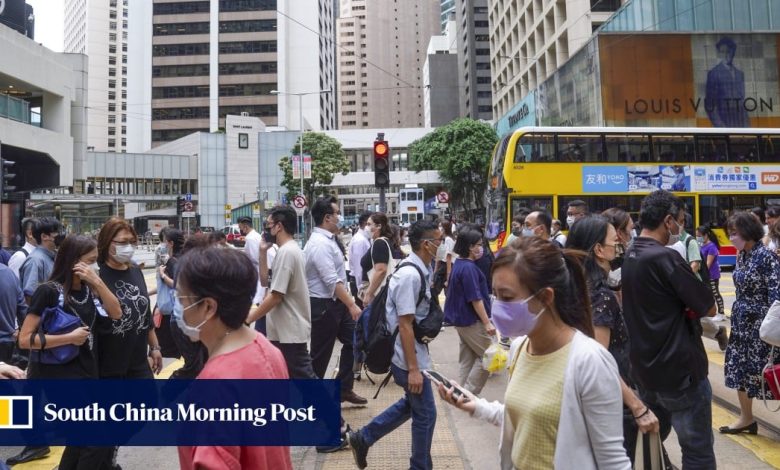Hong Kong banks vow to ease loans in HKMA’s task force to help borrowers, small businesses

“HKMA will not instruct banks on how to make the loan [assessments], but make sure that banks adopt a fair and tolerant manner to help clients,” Yuen said in a media briefing on Friday. “The task force is a channel for SMEs to reflect their [funding] difficulties, and for the HKMA and lenders to work with them in finding a solution.”

The two-week approvals pledge would be a major improvement from the current process that takes between two and three months, said Eric Tso Tak-ming, the chief vice-president of mortgage broker mReferral.
“A speedy approval will provide more certainty to homebuyers, which will allow them to better prepare for their finances,” Tso said.
The squeeze has been particularly painful in the property industry amid a protracted sales slump. Some SMEs have been asked by lenders to fortify their property collateral, as real estate prices have fallen faster than the banks’ valuation, said Danny Lau Tat-pong, the honorary chairman of the Hong Kong Small and Medium Enterprises Association.
To ease the pain, Hong Kong’s Financial Secretary Paul Chan Mo-po last week urged the six largest banks to ease the liquidity pressure for SMEs and to ensure that the quick-approval policies would be executed at the front line.
“SMEs are vital to Hong Kong’s society and economy,” said Sun Yu, the chief executive of the Bank of China (Hong Kong), one of the city’s three currency issuers. “Supporting SMEs is not merely our profession and our business, it is also the social responsibility that we must bear.”
The task force will handle the financing needs of SMEs on a “case-by-case basis”, said the HKMA’s chief executive Eddie Yue Wai-man. “The task force will also identify problems or industry-wide issues for improvement. It will arrange regular meetings to enhance communication between the HKMA, SMEs, chambers and other stakeholders.”
Hong Kong’s oldest trade guild, which traces its establishment to 1861, said it welcomes the task force’s pledge to alleviate the funding pressure faced by small businesses.
“It will ensure the implementation of proactive bank policies in frontline services, particularly in addressing complaints about mortgage reviews and requests for early loan repayments,” HKGCC said. “While some defaults on loans are expected, the positive impact of assisting most SMEs is anticipated to outweigh it.”
The bad debt ratio among SMEs is about 3.4 per cent, double the industry’s non-performing loans, said the HKMA’s Yuen.
“Still, the default ratio is not high among SME loans,” Yuen said. “We are not worried about the bad debt ratio as a result of banks’ tolerant approach to SMEs.”
Lawmaker Jeffrey Lam Kin-fung, who called for the HKMA to help the SMEs, also welcomed the new moves, as the task force and faster mortgage approval will add transparency and be helpful for SMEs which apply the mortgage loans.
“If the banks can extend such quick approval to SME loans, that would be very helpful in supporting their operations and survival,” said Lam, who is representing the Business and Professionals Alliance for Hong Kong, a local political party.
The bankers’ guild is also doing its part in response to the nine relief measures unveiled by the government in March. Banks are barred from shrinking their credit limits if the collateral value depreciates, and they must give customers at least six months of grace period if their credit were to be adjusted.
The banks promised in March to refrain from requesting the early payment of mortgages even amid declining property prices for so long as the monthly instalments are kept up. If borrowers cannot repay their loans after restructuring, banks would still need to take appropriate actions as risk management measures, Yuen said.
“HKAB since March has adopted a wide range of measures to support SMEs,” said Lim, who is also the chief executive of HSBC Hong Kong, adding that the city’s banks have not reduced their loans to SMEs.
The total outstanding value of mortgage loans increased 1.4 per cent in the first six months of 2024, negating any suggestion that banks have tightened their loans, she said. The HKMA’s data also showed that overall loans to small businesses had not dropped.
Around 7,000 of HSBC’s SME customers have benefited from the government-mandated relief measures such as interest rebates, waivers, new facilities or loan extensions, she said.
Standard Chartered Bank also increased its help to SMEs, increasing the number of companies that can get special repayment arrangements by 10 per cent in the first seven months of 2024, according to its Hong Kong CEO Mary Huen Wai-yi.

